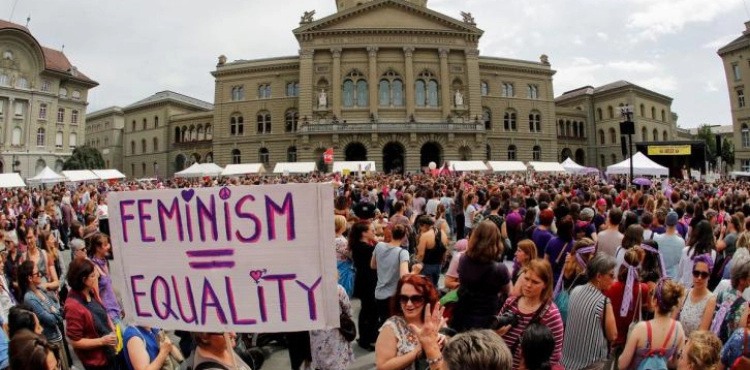Throughout Switzerland, women began a day of protests against what they described as the slow and unacceptable steps taken by the state to apply equality between men and women.
In 1991 there were similar protests, with about half a million Swiss women.
Swiss women have a long history of campaigning and demonstrations to accelerate the application of gender equality. Millions of women in Europe also claimed their right to vote after the end of the First World War in 1918 but did not receive that right until 1971.
In 1991, there was not a single Swiss woman in the government, and maternity leave was not legal for women.
The Swiss Supreme Court has asked Abinsel to change its policy to grant women the right to vote. The historic province of Abenzel, in northeastern Switzerland, was the last province in the country to reject women´s right to vote.
How far has Switzerland changed?
Some things have changed in this European country. Since then, eight women have been appointed as ministers, and the passage of legislation has become legal.
However, women in Switzerland receive less than 20 per cent of their salaries, are not well represented in managerial positions, and the issue of childcare is no longer too expensive for them.
Switzerland was in the last position in an ILO survey on women´s employment in May 2019.
Journalist Peters Born was pregnant at her first child when she participated in the 1991 demonstrations and will again participate in protests on Friday, 2019.
When she returned to work after her daughter was born, she was shocked; no one expected her to return to work, and certainly if she returned, she would not return to her full work. "The resistance (for her return) .
Paola Ferro, one of the organizers of the 1991 protests, also took part in Friday´s demonstrations.
Ferro says she agrees that there has been progress for 28 years, but the salary and pension gap still exists. Swiss women´s pensions are 37 percent lower than men, mainly because they have time to raise their children.
There were proposals to protest last year, in response to what some saw as a rift in the government´s decision to re-examine gender equality.
The government´s decision was only for companies with more than 100 employees, a measure that women´s trade union leaders said was meaningless in practice.
Since then, women throughout Switzerland have begun to prepare for these demonstrations using social media.
What will managers do?
Thousands of women have told their managers not to work on the day of demonstrations, while some will leave at 15:30 to reduce their working hours by 20 percent to draw attention to the wage gap between men and women, which also accounts for 20 percent of the country.
But Switzerland does not have a long history of sit-ins and strikes, and it is unlikely that a large number of staff will take part in the protests.
Some business owners and users say the demonstrations are illegal, but some big companies have adopted a pragmatic attitude.
Migros, the giant business firm, said it would prefer not to leave its employees to take part in the demonstrations, but would not take disciplinary action against anyone who did so.
Swiss railways have asked their workers to tell them before they can take part in the demonstrations well enough, and will give the participants a token T-shirt for the day.
Many men will take part in supporting this women´s protest movement, although women demand that they stay away from the front rows, stay in homes to take care of the children, and prepare food for the protesters.
Will these protests lead to a positive outcome?
The real test of the protests and demonstrations is not only reassuring employers and employees, but also whether the issue of inequality for which Swiss women have fought for many years will receive real attention and serious discussion.












